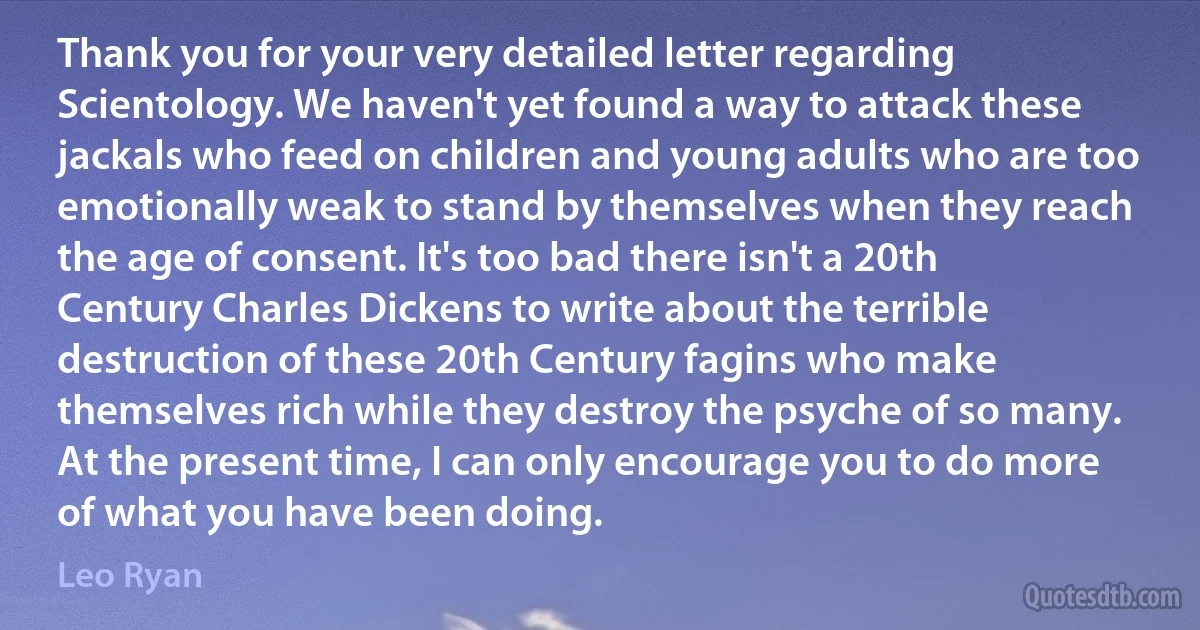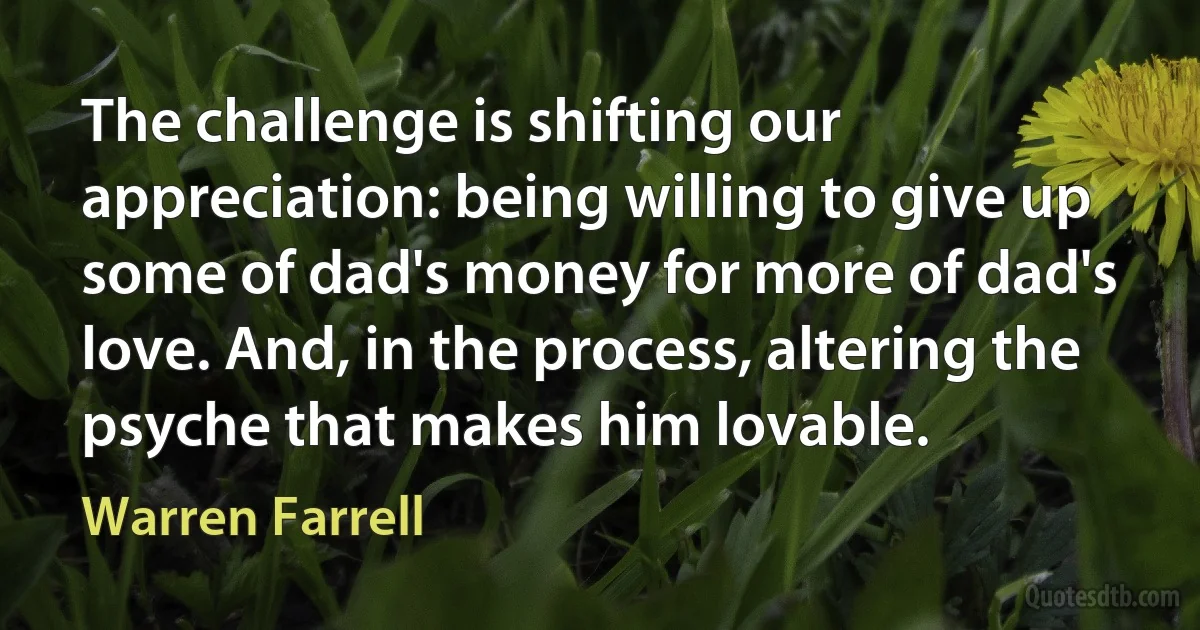Psyche Quotes - page 9
Our monopoly on violence and the particular place we occupy in our national psyche, demands that we must earn and maintain a high level of trust among our community. They are entitled to expect more of us than other institutions – and we keep telling ourselves that we are special – and custodians of the best of our military heritage. This places a very great burden on us, which warrants zero tolerance towards those who violate that fragile community trust.

David Morrison
If they could fill our psyche with fear - as if the imagination of each one of us were Afghanistan and they were the Taliban - they could deprive us of the trust and confidence required for a free society to work. They could prevent us from ever again believing in a safe, decent or just world and from working to bring it about.

Bill Moyers
Artistic expression might be seen as a Darwinian protection device for the psyche of fragile individuals, for whom sensuous contact with the outside world is too much to bear, and is repressed, and must be brought up and thrust out into the open from time to time at great effort in order for them to simply survive emotionally.

Mark Heard
My psyche was scarred in my art student days in Europe, just after World War II, by an ineradicable memory of war-wracked innocents. In their eyes lurk all of mankind's questions and answers. If mankind would look deep into the soul of the very young, he wouldn't need a road map. I wanted other people to know about those eyes, too. I want my paintings to clobber you in the heart and make you yell, "DO SOMETHING!"

Walter Keane
The realization that our mental functioning is largely irrational was arrived at by several thinkers at the same time, including Friedrich Nietzsche... Freud, who was much influenced by both Darwin and Nietzsche... was its most profound and articulate exponent. ...Schnitzler, Klimt, Kokoschka, and Schiele also discovered and explored new aspects of our unconscious mental life. They understood women better than Freud... and they saw more clearly than Freud the importance of an infant's bonding to its mother. They even realized the significance of the aggressive instinct earlier than Freud did. ...Plato discussed unconscious knowledge ...pointing out that much of our knowledge is inherent in the psyche in latent form. ...Hermann von Helmholtz... advanced the idea that the unconscious plays a critical role in human visual perception.

Eric Kandel
I studied anthropology in college, and one of the things I learned was that certain human social structures always reappear. They can't be eliminated from society. One of those structures is religion. Today it is said we live in a secular society in which many people - the best people, the most enlightened people - do not believe in any religion. But I think that you cannot eliminate religion from the psyche of mankind. If you suppress it in one form, it merely re-emerges in another form. You can not believe in God, but you still have to believe in something that gives meaning to your life, and shapes your sense of the world. Such a belief is religious.

Michael Crichton
We're not really the authors of our work: we're channels, tuning into another frequency, another dimension, and bringing that information down into the physical world, where - using the tools, the talents and perspectives that are uniquely ours - we transcribe and embellish that information, transforming it into that wonderful creature called a Story.
In the end, it doesn't matter whether the transmission is instant or unfolds slowly, it's the opening up that's so magical. That moment of realizing that you're connected to something so much bigger than yourself. I remember, years ago, when I was just beginning work on Moonshadow, standing in the shower - mouth open, eyes glazed, still as a statue - watching the ending of the series play out on the movie screen of my psyche. Make no mistake: I didn't create the scene, I just witnessed and transcribed it.

J. M. DeMatteis
A more or less superficial layer of the unconscious is undoubtedly personal. I call it the "personal unconscious". But this personal layer rests upon a deeper layer, which does not derive from personal experience and is not a personal acquisition but is inborn. This deeper layer I call the "collective unconscious". I have chosen the term "collective" because this part of the unconscious is not individual but universal; in contrast to the personal psyche, it has contents and modes of behaviour that are more or less the same everywhere and in all individuals.

Carl Jung
Whereas the personal unconscious consists for the most part of "complexes", the content of the collective unconscious is made up essentially of "archetypes". The concept of the archetype, which is an indispensable correlate of the idea of the collective unconscious, indicates the existence of definite forms in the psyche which seem to be present always and everywhere. Mythological research calls them 'motifs'; in the psychology of primitives they correspond to Levy-Bruhl's concept of "representations collectives," and in the field of comparative religion they have been defined by Hubert and Mauss as 'categories of the imagination'... My thesis, then, is as follows: In addition to our immediate consciousness, which is of a thoroughly personal nature and which we believe to be the only empirical psyche (even if we tack on the personal unconscious as an appendix), there exists a second psychic system of a collective, universal, and impersonal nature which is identical in all individuals.

Carl Jung
Our mind (and there are no individual minds - only "mind", which is the accumulation of man's knowledge and experience) has created the notion of the psyche and evolution. Only technology progresses, while we as a race are moving closer to complete and total destruction of the world and ourselves. Everything in man's consciousness is pushing the whole world, which nature has so laboriously created, toward destruction. There has been no qualitative change in man's thinking; we feel about our neighbours just as the frightened caveman felt towards his. The only thing that has changed is our ability to destroy our neighbor and his property.

U. G. Krishnamurti
The relation between psyche and soma, mind and brain, are peculiarly intimate; but, as in marriage, the partners are not inseparable: indeed their divorce was one of the conditions for the mind's independent history and its cumulative achievements.
But the human mind possesses a special advantage over the brain: for once it has created impressive symbols and has stored significant memories, it can transfer its characteristic activities to materials like to stone and paper that outlast the original brain's brief life-span. When the organism dies, the brain dies, too, with all its lifetime accumulations. But the mind reproduces itself by transmitting its symbols to other intermediaries, human and mechanical, than the particular brain that first assembled them.

Lewis Mumford


